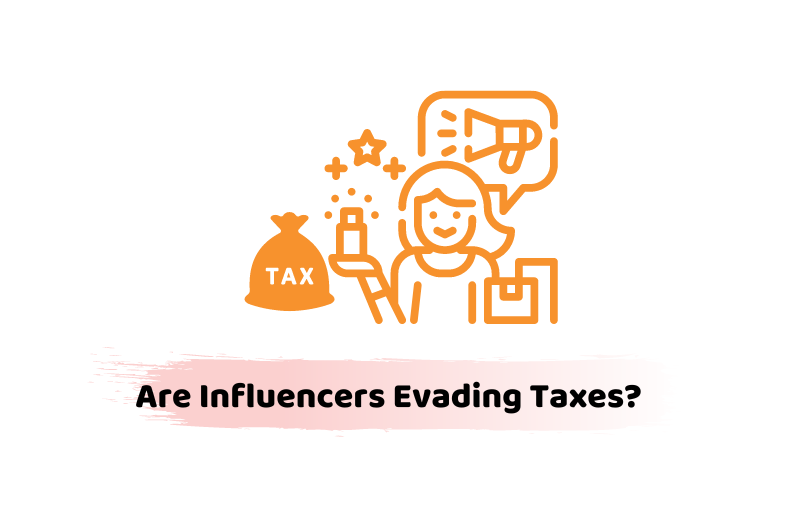You must be aware of the fact that there is no existence of influencer tax to date. However, online influencer taxes are real and they are associated with the influencers who are creating online and sharing it online to make earnings. People often enquire about ‘are influencers evading taxes?’, as they think that influencers are making extra money by using online mediums for free. This is not the case at all.
Whether you are using an online medium as an influencer full-time or part-time to make earnings, you are liable to declare this source of income to HMRC while you are submitting your self-assessment tax returns. In case you fail to do so to avoid the tax bills on this extra income, you will have to pay a hefty fine and struggle with penalties. Moreover, the tax implications will only be implemented when your income has gone above a certain limit threshold. Further in the discussion of this blog, we will cover the facts about who are online influencers, what are the tax implications for online influencers, and whether they are evading taxes or not.
Get in touch with one of our professionals to learn more about our influencers evading taxes. We will love to hear out your queries and provide instant solutions.
What is Online Influencer
This is imperative to know who is an online influencer and what is his role. According to the set rules of social media, an individual is considered an online influencer when he has the skill to influence his followers to act in a certain way. This could be related to the fashion sense, social behaviours or any other specific matter. Influencers are also known by the name of content creators.
If we talk about the role of online influencers in society, they are used by multiple brands to endorse their services and products. This will help the brands to increase their sales as well as the fan following. The online platform and the digital fan following of influencers are so much influenced by the words and content they create that they purchase the products and services trusted by them. According to recent research, billions of people are connected worldwide by social media. This is a big achievement to bring them all together under the influence of your content.
Tax Limit that Influencers Owe to the Government
The case of tax-free personal allowance is just the same with online influencers as it is with self-employed individuals. The limit is £12,570 for each year. In simple words, you can say that you do not have to pay any tax unless your earnings cross a certain limit. However, this is important to know here that the requirement of completing the self-assessment is still there.
According to the Competition and Markets Authority (CMA), the influence of the online content creators is very powerful on the followers and they act accordingly to make purchases. This has a lot to do with the way we act when we decide to buy a product or avail of a service. Moreover, the products that are sent to the influencers as PR are also considered as part of payments which will add to their limit and they will pay the tax accordingly.
Are Influencers Evading Taxes?
As mentioned above, the process of tax is difficult and these gifts and PRs make it even harder for the influencers. The reason behind this is that these products and gifts play the role of adding up to the earnings of the influencers. It will affect their tax payments immediately. When it comes to the question of evading taxes by the influencers, this is not a possibility when you are residing in the UK and making content for your followers.
You are surely noticed by HMRC. Your work and payment are all under observation and you are liable to declare this source of income while you are submitting your self-assessment tax returns. If you fail to do so or try to evade the taxes by hiding your extra income stream, you will be in trouble. You will have to pay hefty fines and have to struggle with penalties. This can damage your future of being an online influencer.
Who is Considered a Trading Influencer?
HMRC does not define the influencers as traders, at least not all of them are traders. According to the Institute of Chartered Accountants in England and Wales, you are considered a trading influencer only when you have set up your day-to-day schedule to create content that has commercial value. You are also marketing your work for your financial benefit.
On the other hand, if you create content for the sake of fun and your income does not cross the limit threshold, you will not be considered a trading influencer. You will not pay any taxes, however, you will be liable to complete the process of self-assessment still.
The Bottom Line
Now that you have gathered a fair amount of information about ‘are influencers evading taxes’, we can say that being an online influencer may sound fun unless your earnings cross a certain limit of the threshold. Because that is when you have to deal with the tax payment and other relevant obligations by HMRC. However, if you learn to handle the tax payments that count as your earnings, you will be smooth with the process and you have a chance of getting good in this market. We hope these few minutes of reading have helped you to develop a better understanding. This will allow you to plan strategically for your work and marketing action plan.
Call or request a callback to speak to one of our professionals to discuss your queries about whether influencers evading taxes. We are available from 9:00 am – 05:30 pm Monday to Friday.
Disclaimer: The information about ‘are influencers evading taxes’ provided in this blog includes text and graphics in general. This does not intend to disregard any of the professional advice.





















































